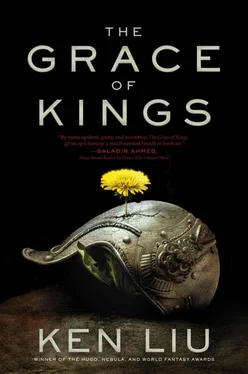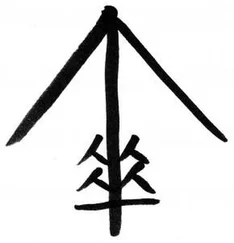The entrance to the aborted tunnel from Dasu to Rui was located several miles down the shore from Mazoti’s makeshift shipyard, where two hundred men put on a show that drew the attention of Marana’s airships.
Meanwhile, a grain storage depot had been built over the abandoned shaft of the tunnel, and carriages could be seen pulling into the depot and then leaving, apparently to gather more goods from the rest of the island. Marana’s airships took note of the activity but attributed it to merely another effort to stockpile grain against a lean year.
The airships could not see that the carriages entering the depot were much lighter than the ones that left it. They were not carrying things into the depot but away from it. Instead of grain, the carts carried dirt, rocks, and earth excavated from under the sea.
Luan Zya had combed through the strange inventions gathered by Cogo Yelu and found a few of particular interest. One was a method of splitting stone. Water mixed with certain salts extracted from herbs gathered and prepared by the inventor, an old Faça herbalist, could be poured onto stone surfaces, where the paste would seep into the cracks, large and small. After the rock had been stewed in this brine for a while, a second, different solution of salts would then be poured over the rock, and where the two mixtures came into contact, crystals formed.
Like ice in winter, millions of tiny crystals growing in the cracks exerted a force that pried granite and schist apart, and made solid walls of rock as soft as cheese.
The second invention that Luan Zya selected was a way to pump air with a hand-cranked bellows into a sealed tank of water until the water, under great pressure, shot out of a hose. The pressurized stream of water could be focused to strike at any surface with great force. When this water was brought to bear on the rocks softened with the mixture of salts, the rocks crumbled like wet sand.
The combination of these two inventions allowed tunneling through deep rock at speeds that were impossible to conceive. Best of all, it required no use of firework powder, and so was safe and undetectable by surveying airships.
For six months, the Dasu army toiled in secret, completing the dream of Emperor Mapidéré to build a path between Dasu and Rui that went under the sea.
RUI: THE SEVENTH MONTH IN THE THIRD YEAR OF THE PRINCIPATE.
The shipyard was only a decoy, Kindo Marana thought. I was fooled by a simple trick.
He had always been a careful man, but he was too focused on what could be seen and measured, what could be marked down in the notebooks of scouts flying over Dasu. He had been caught by what lay beneath the numbers, hidden by the appearance of superficiality, under the ocean waves.
He imagined the Dasu army emerging from beneath the sea, an endless stream of men erupting onto the surface like a fresh lava flow. It was a trick that he himself had used on Wolf’s Paw against the hesitating General Roma. Mazoti was not above copying her enemy’s successes.
It felt like an unworthy loss, as though someone had taken advantage of a loophole in the tax code.
Luwen, the surrendered Dasu soldier, made his way next to Marana.
“We were both fooled,” Kindo said. “You were just a pawn in her game. She whipped you not because she needed you to work harder, but to hide her real plans.”
Luwen grinned at him. Marana looked back, and his face fell as he finally understood.
With one quick stroke, Luwen lopped off Marana’s head. Then he leapt from the wall, holding aloft the head by its hair.
The Dasu soldiers below the wall had been prepared and caught Luwen safely with a taut cloth stretched out on poles. Mayhem and confusion reigned on the walls of Kriphi, and commanders still recovering from the shock of King Kindo’s death debated whether to immediately surrender or try to negotiate for better terms.
Marshal Mazoti walked up to the man getting off the stretched canvas trampoline.
“Welcome back, Daf.”
Daf cracked a smile. “How hard it is to foresee how life will turn out. Back when our corvée gang joined the rebellion, my brother and I thought we’d never be whipped again.”
Mazoti clasped him by his arms. “Lord Garu and I will not forget your sacrifices. I hope your wounds have healed.”

News of the conquest of Rui by Dasu ripped through the Islands of Dara like a tsunami. Mazoti was only the second opponent to ever triumph over the great Kindo Marana. The other Tiro states, already craving war, began to fight, intuiting that the hegemon would be distracted by the Dasu victory and not pay attention while they fought over more territories.
Zyndu immediately ordered King Cosugi of Haan and King Théca of North Géfica to increase their vigilance and send out their navies to aid the remnants of Marana’s navy in a blockade of Dasu and Rui. He did not bother sending out a messenger to demand an explanation from Garu. What was there to explain? Garu, the man he once thought of as his brother, had rebelled against the hegemon. It was proof of his original treachery at Pan; he was a betrayer through and through.
Dasu still had no navy to speak of. Rui was also much farther away from the Big Island than Dasu was from Rui, so Mazoti’s tunneling trick would not work a second time. Just like Mata Zyndu was once trapped on Wolf’s Paw, he would now trap Kuni on Rui. It was still an island prison, just a bigger one.
But he would go visit Kuni’s family.

Mira wandered the streets of Çaruza aimlessly. She browsed at the market stalls — she had enough money to buy anything she wanted, but nothing appealed to her. She was simply stalling for time, not willing to go back to the palace. At least here, in the streets, with the right dress, she could be anonymous and pretend to be just another Cocru lady of sophistication, instead of—
Instead of what?
She was angry with herself, with Mata, with the courtiers and ladies-in-waiting and the countless servants who surrounded the hegemon. Since coming back from Pan to Çaruza, her position had grown only more awkward. What was she? She still oversaw the preparation of Mata’s meals and tidied his bedchamber, but ministers and couriers called her Lady Mira. Mata had not asked her to come to his bed, and yet everyone seemed to assume that she already visited it with regularity.
I suppose I should ask to go home .
But she never made such a request. Now that she had seen the world, had become used to being in the company of kings and dukes and generals, she wasn’t sure if she could tolerate the cold glances of the villagers back home, who would still speak of her as being “from away.”
It was true that, as she walked through the streets of this metropolis, Mata’s men followed her from afar, keeping her in sight, but she knew it wasn’t because she was their prisoner. Mata had said that he would take care of her, and he would keep that promise wherever she wanted to be. They were there to protect her, because they believed that the hegemon’s enemies might try to harm him through injury to her.
Are they right? Is that how he feels about me?
In truth, she wasn’t sure how she felt about Mata either — indeed, she wasn’t sure if she knew him at all, even after all this time. He was unfailingly polite to her and inquired after her well-being every day. Whatever she wanted, he tried to satisfy her.
Once, she mentioned that she missed her old home, and a few days later, she found her old hut — which her parents and Mado and she had shared back in the Isle of Vines — in the palace courtyard in front of her chambers: every foundation stone, every wooden slat, every layer of wall-mud was in place, and the roof had been freshly thatched. Inside, every piece of furniture, every dented pot, every chipped cup and bowl and plate had been moved over and placed exactly the way she had left them on the day she set out to search for Mado.
Читать дальше













